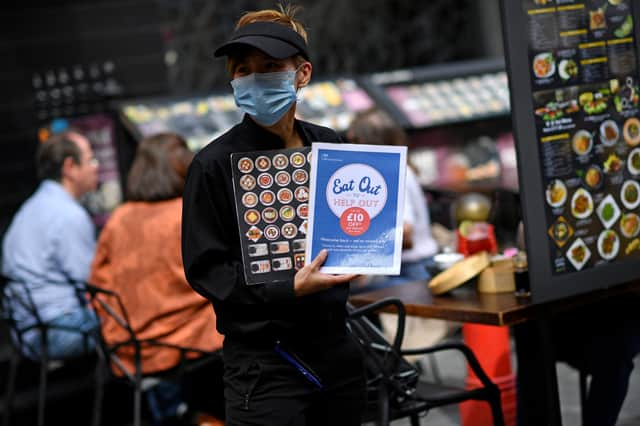Restaurants call for Eat Out to Help Out to return - here's how it impacted Covid cases last year


Takeaway giant Deliveroo, along with 330 restaurant partners, have asked the Government to reintroduce the Eat Out to Help Out scheme when restaurants are able to reopen to the public.
In a letter to the Prime Minister, Deliveroo, and CEOs of major restaurant partners such as itsu and Pizza Hut UK, said that with all restaurants being closed, many were “under immense financial pressure”.
Advertisement
Hide AdAdvertisement
Hide AdThe letter said: “Even when [restaurants] are able to reopen to customers, restrictions around mixing of households and social distancing measures mean that a return to trading at full capacity will remain dependent on the successful vaccine rollout.”
The letter adds that government support was “critical” to protect jobs, stating: “The withdrawal of support too early or too suddenly risks viable businesses failing just as the light at the end of the tunnel is becoming clearer.”
‘Five steps to support UK restaurants’
In the submission to the Government, Deliveroo and its fellow signatories urge ministers to take the following five steps to support UK restaurants to survive the ongoing Covid-19 pandemic.
These steps are:
- Extending VAT reduction: the Government should extend the VAT cut on restaurant food until the end of 2021, and consider the case for making the VAT cut permanent in the future
- Extend business rates relief: extending the business rates relief for a further financial year will prevent more empty premises on UK high streets post-pandemic, the letter states
- Maintaining the furlough scheme: the letter asks that the Government gives both staff and business owners confidence about their future by committing to maintaining the furlough scheme as long as is necessary for restaurants to fully return to dine-in
- Support businesses on rent: when the eviction moratorium ends, the Government should work to ensure that landlords are prevented from evicting tenants based on rent arrears, provided tenant businesses pay current rent obligations and agree to a payment plan to repay past liabilities
- Take action on testing and vaccinations: the Government should ensure that key workers in the food sector are part of the second phase of the vaccine rollout, after NHS staff, police and teachers, and seek to employ Lateral Flow Testing kits that can be administered in restaurant kitchens
Did Eat Out to Help Out cause Covid-19 cases?
The Eat Out to Help Out scheme ran from Mondays to Wednesdays during August, and saw diners get discounts of up to £10 per person on food and soft drinks.
Advertisement
Hide AdAdvertisement
Hide AdIt was used 100 million times in August, with over 52,000 businesses registered for the scheme.
However, research from the University of Warwick which was released in October suggested that the scheme caused a “significant” increase in new Covid-19 infections.
According to the study, a sharp increase in Covid-19 infection clusters appeared around a week after the scheme began.
The study said: “The estimates suggest that the scheme is responsible for around eight per cent to 17 per cent of all infections during the summers months and likely, many more non-detected asymptomatic infections, that may have substantially contributed to accelerating the second wave of the pandemic.”
Advertisement
Hide AdAdvertisement
Hide AdAreas that saw a high uptake of the scheme also saw a decline in new infections a week after the scheme ended.
Dr Thiemo Fetzer, of the CAGE Research Centre in the Economics Department at the University of Warwick, said: “[The study] strongly suggests that the link between Eat Out to Help Out and new Covid-19 infections is casual: when people were not dining out as part of the scheme, there were fewer new cases of the virus.
“Eat Out to Help Out may in the end have been a false economy: one that subsidised the spread of the pandemic into Autumn and contributed to the start of the second wave.”